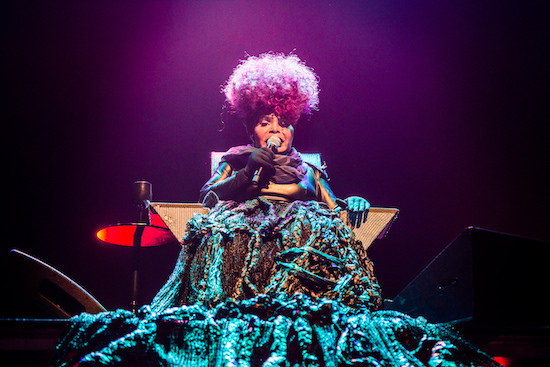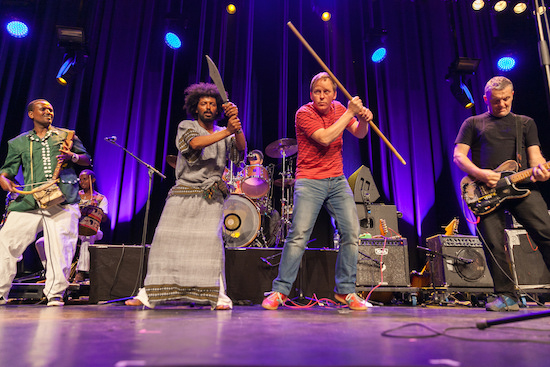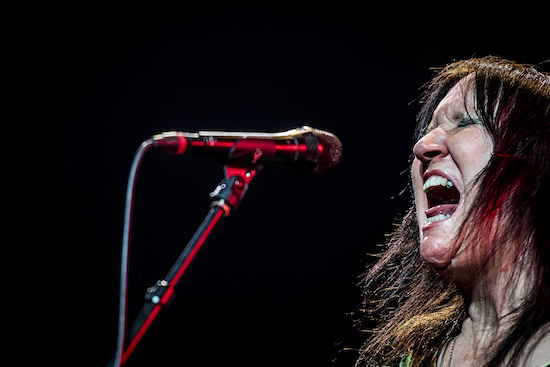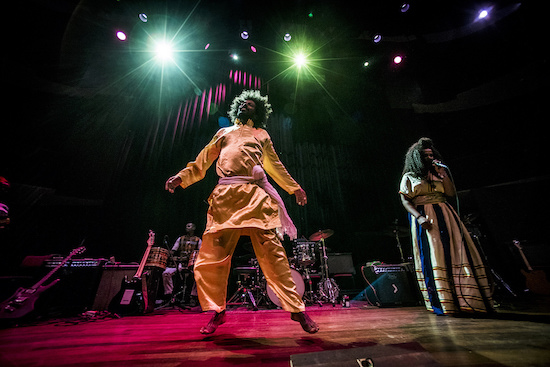Thirty-two tons of metal resonates topically across the Dutch city of Utrecht, delivering a polite rebuke to a strain of orange fascism an ocean away from the homegrown kind. This writer, along with several other press trip-accepting ones like him, is about halfway – 180 feet – up the Domtoren, which is of course the Netherlands’ tallest cathedral building. Crammed into a closet-sized room inside, we watch Malgosia Fiebig play the carillon, a network of church bells controlled by a keyboard. “We don’t involve ourselves politically, we work for the city, but we do react to what’s going on in the world,” she tells us, and breaks into a campanological version of the Beatles’ ‘Yesterday’.
That all assembled understand this to be about the American election results earlier in the week is perhaps testament to the ability of people, especially those in an emotional trough, to ascribe meaning to pop lyrics that was never intended. Fiebig’s job as the carillonneur of the tower (a position which has existed since 1594 – you’ll impress someone with all these facts one day) invites her to ring out current events in this manner. Indeed, earlier today she performed three songs by Leonard Cohen, whose death people would have likely discovered at breakfast. Secular pop and Christian expression seem to coexist peacefully in the Domtoren.
The intersection of faith and frolics, higher planes and hi-jinks, is something I spend quite a bit of time trying to square during Le Guess Who? – a four-day festival across several Utrecht venues, and the reason I’m here. Celebrating its tenth edition this year, earlier lineups were heavily weighted towards indie rock, albeit the more ambitious end of the genre. Gradually, the balance of power has shifted enough that LGW? 2016 is less a rock fest with some scattered Others than vice versa. It’s possible to spend every available minute watching live acts and not see any guitar/bass/drums units – my tally on that front, I think, runs to about twenty minutes apiece of Deerhoof, Girl Band and Savages, none of whom are less than decent.
In the form of Brazilian samba empress Elza Soares, whom I will admit to having mere passing knowledge of before this weekend, LGW? also dishes up the best show I’ve seen all year. Hoisted, wheelchair-bound, onto a podium by a coterie of subservient men (aka the road crew) under cover of darkness pre-show, Soares sports a purple Afro and a dress made from hundreds of feet of black rope which cascades across the stage below. She looks like a Disney villain and sings like two hundred Woodbines being pushed through a cheesegrater as the Rapture descends. Her band are all jazz poindexters who sit down to play their ugly-ass guitars, but this just makes her near-motionless glower seem more awesome, plus their chops are dead on anyway. People utterly adore this woman – up in the nosebleed seats, someone next to me screams requests as if anyone on stage could possibly hear – and for my part, I’m almost ready to become one of those people who say YASS QWEEN SLAAAY all the time. Almost.

Aside from this spectacle, which relates to nothing but itself, something that features strongly throughout the bill – not the theme of Le Guess Who?, but kind of a personal one for me this weekend – is music drawing on, if not specific religious belief, then a spirituality of some kind; likewise, music which has a distinct meditative quality, pointing towards solitude and contemplation rather than communal experiences. This is a bold move when dealing with a few thousand people, a significant proportion from other countries, in a city that seems to run on strong Belgian beer. If they shuffle out of a room in search of more of it mid-set, pricking the bubble of reverie, are they ingrates who’ve made the category error of arriving here with their Rock Festival Mentality?
Reasonably speaking, no they aren’t – as I say, there’s radness on a stage somewhere at basically any given moment, and to that end you can hardly blame people for being restless. Moreover, Le Guess Who? is unfailingly pleasant, with no blind drunkenness, rowdy behaviour or ill feeling really witnessed. A couple of moments jar slightly. Before The Ex play a typically superb set on Saturday evening, joined by Addis Ababa band Fendika, Zerfu Demissie appears for a short solo performance on the begena, an Ethiopian string instrument traditionally used to accompany prayer. Its hypnotically buzzing tones and Demissie’s beatific singing voice are a wonderful balm, but this room – one of six in the sprawling Tivoli-Vredenburg complex – isn’t its ideal setting, which is to say that people mostly just talk through it.
The following afternoon, Phurpa play for just under two hours in the same room. A Russian collective, performing as a duo in this instance, their set is tonally immense and unmistakably ritualistic. Based on the music and performance of Bon, a Tibetan religion that’s a kind of Buddhist analogue, a Phurpa set incorporates unfeasibly guttural Tantric throat singing, giant horns and other apparently authentic instruments (even their drinking vessels are roughly hewn, dented metal cups) and shrouds which obscure their faces. Headhunted by Sunn O))) for some support slots last year, fans of that group who aren’t in it purely for the riffs are recommended to sample their un)))plugged brethren.
Phurpa are visually and aurally glorious, smoke rising from the Earth’s bowels and transmuting into sound, and brook no compromise in the quest to enact their rites in full. All of which makes everyone sitting around on large, brightly coloured cushions and occasionally nipping to the bar look a bit dopey, myself obviously included. Behind me, a man wearing a fedora shuts his eyes and tries, manfully and I suspect unsuccessfully, to achieve oneness. While Phurpa are one of the best things I see all weekend, I couldn’t honestly say they transcended their setting – perhaps some more ancient and/or consecrated space would have served them better. (Not that this would be foolproof: they played in a Bristol crypt last year and just over ten minutes into this recording you can clearly hear a passerby shout PENIS through the window.)

The Hertz room, upstairs in the same complex, feels a bit like a conference centre. Late on Saturday night, New York’s new age phoenix from the flames Laraaji is here to regale us with his recipe for equilibrium of the soul. If the performance had featured flip charts and team-building exercises, it wouldn’t have felt entirely out of place, but there’s much pleasure to be derived from Laraaji’s staples of autoharp (which he spends the first 15 minutes tuning, scuffing the vibe a little), gong and his own avuncular patter.
We learn about how he acquired his first zither, how Edward Larry Gordon adopted the Laraaji persona in the late 1970s, how he came to work with Brian Eno and his forays into laughter therapy, which explains his habit of chuckling for no apparent reason mid-sentence. So unflappably positive is his mindset, he reflexively calls his home country the ‘United States Of Amazing America’ – although, in fairness, its continued capacity to amaze is hardly in question. Beaming melodies and astral drones created with gong, mallet and microphone are looped to subtly trancelike effect, and by the end at least a couple of cynics are converted.
Before we enter the impressive Janskerk church to see Aine O’Dwyer on Saturday evening, a friend recalls a recent set of hers in Dublin – or more specifically the immediate aftermath, where a bloke came over to her for the sole purpose of informing her he “didn’t get it”. While this lends weight to the belief that all men should be killed, her performance here asks great concentration of those present, and people could be forgiven for not ‘getting it’. Like many of London-based Irishwoman O’Dwyer’s sets, including her best known recording Music For Church Cleaners and two recent tapes on the Fort Evil Fruit label, it utilises a pipe organ – the controls for which require her to sit in a balcony box, above the audience and hidden from their view. Smeary, ethereal vocals arrive and depart; sheets of paper (perhaps a score?) flutter to the ground now and again.
At times, matters are so minimalist it almost resembles Cage’s ‘4’33”’, where each cleared throat and whispered “anyone fancy a pint?” becomes part of the performance. Patience is rewarded, though, via a rushing crescendo towards the end and the general feeling that you’re witnessing someone with a singular, sometimes brilliant musical vision. Also, I find a fiver on the floor as everyone’s leaving – you’re not having this, church cleaners!
French improviser/composer Delphine Dora mines comparable territory to O’Dwyer, working with a clear sense of melody and what some might call a hauntological feel. Her Saturday performance in Theater Kikker is fairly straight-bat by her standards, solo piano in a very measured, American minimalist style with occasional bursts of pace and/or jauntiness. Her drawn-out, ghostly vocal is the only thing that might raise an eyebrow if this was a lunchtime set in the foyer of your local art centre, which I don’t mean to sound dismissive of a deft and consistently creative artist.
Fifteen years before Dora was born, two notables of the Sunday evening timetable were laying the groundwork for her output now: a moving yet resolutely unpretty vocal style on one hand, a crosshatching of folk, minimalism and sound art on the other. These are Patty Waters and Pauline Oliveros, the former of whom plays in Tivoli-Vredenberg’s main hall – which is several times larger than the crowd she draws, but is plausibly justified by its acoustics. Waters, 70 this year, performs with a jazz trio including pianist Burton Greene, who featured on the mid-60s recordings for the ESP-Disk label which made her a revered figure in rarified circles. On this evidence, which was recorded for Dutch radio, both Waters and Greene remain captivating performers: piano innards are manipulated, Greene’s parts shadowboxing with Tjitze Vogel’s dextrous double bass, while Waters conjures maelstroms of emotion from her remarkable albeit divisive voice. Whether repeating the mantra “love…” in wracked gasps, offering interpolations of ‘Strange Fruit’ and ‘Hush Little Baby’ or serving a devastating ‘Moon, Don’t Come Up Tonight’, the cavernous setting takes nothing away from the special intimacy of this hour.

Back up in Hertz, Oliveros – at 84 the most senior performer at Le Guess Who?, and that’s with some close competition – performs a solo set on her staple instrument, the accordion. This one is hooked up to pedals, and apt to leap, almost cartoonishly, from passages of languid drone to flurries of hyperactive sound. For better or worse, it renders drifts into dreamstates almost impossible, and is certainly more surface-level challenging than her older works for accordion – yet also more playful and spry, thumbing its nose at simple definitions of ‘deep listening’. Nearly everyone stays in their damn seats, too.
A major factor in LGW? 2016’s shift in focus is the curatorial aspect, which has been ramped up this year. Four acts – Wilco, Savages, Julia Holter and Suuns – get ten to twelve picks each, and all have more radical tastes than their music might lead you to believe. Holter, in particular, is responsible for the presence of Laraaji, Aine O’Dwyer, Delphine Dora, a few things I don’t catch such as Circuit Des Yeux and Maya Dunietz – and Karolus Magnus, a Dutch choir who specialise in Gregorian chants. A friend and I take a stroll to see them on Sunday afternoon and walk into a different church than the one they’re actually performing in; people are tidying up post-service and an earnest man who I take to be a pastor hands us plastic cups of orange juice.
“Uh, I think we’ve come to the wrong place,” I say. “Oh no,” he beams, in a game effort to seize the moment, “you’re certainly in the right place!” Converts only to a religion that could promise us improved orienteering skills, we make our excuses and end up catching the tail-end of Karolus Magnus, who are stirring and dignified. One choir member comes over to chat – I think he just wanted someone to talk to – and says that although he doesn’t really know who Julia Holter is, it’s wonderful to be able to perform in front of a different, younger audience.
His English is first-rate, of course, just like Barry and Bob from Le Guess Who?, Arnold from The Ex, the woman who sold me my train ticket and every other Dutch person I speak to. I’m hardly an inveterate globetrotter, but any monolingual Brit abroad will surely recognise the mix of gratitude and shame that comes when others accommodate your stubborn refusal to meet anyone else’s language even close to halfway. If, in a year or two’s time, the credulous fucking idiocy of the UK from its ruling class downwards has managed to put a spanner in the Netherlands’ economy, who could really blame the nice couple who directed us to the right church if they instead just shrugged and turned on their heel?
To reference Malgosia the carillonneur, Le Guess Who? feels like an escape from what’s going on in the world as much as a reaction to it. In a broader sense, it’s a magnificent experience in large part due to its international outlook and efforts to shrug off Eurocentrism, and should be cherished by anyone who regularly visits this website. LGW? 2017 is already on sale, but there’s no telling what might be round the corner.


